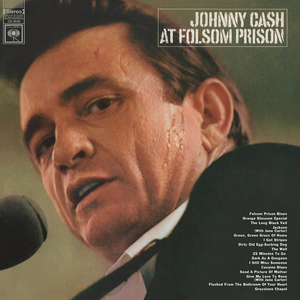
Johnny Cash at Folsom Prison is the first live album by American singer-songwriter Johnny Cash, released on Columbia Records on May 6, 1968. After his 1955 song "Folsom Prison Blues", Cash had been interested in recording a performance at a prison. His idea was put on hold until 1967, when personnel changes at Columbia Records put Bob Johnston in charge of producing Cash's material. Cash had recently controlled his drug abuse problems, and was looking to turn his career around after several years of limited commercial success. Backed by June Carter, Carl Perkins, and the Tennessee Three, Cash performed two shows at Folsom State Prison in California on January 13, 1968. The initial release of the album consists of 15 songs from the first show and two from the second.

The Tennessee Three was the backing band for singer Johnny Cash for nearly 25 years; he was known especially for his country/rockabilly style, although he won awards in numerous categories. In 1980, he reorganized the group, expanding it and naming it the Great Eighties Eight. The band provided the unique backing that would come to be recognized by fans as "the Johnny Cash sound."
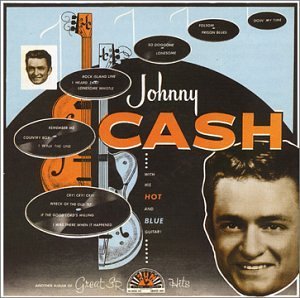
Johnny Cash with His Hot and Blue Guitar! is the debut studio album by American singer Johnny Cash, released on October 11, 1957. The album contained four of his hit singles: "I Walk the Line," "Cry! Cry! Cry!," "So Doggone Lonesome," and "Folsom Prison Blues." It was re-issued on July 23, 2002, as an expanded edition, under the label Varèse Vintage, containing five bonus tracks, three being alternate versions of tracks already on the original LP. In 2012, Columbia Records reissued the album with 16 additional non-album Sun Records tracks as part of its 63-disc Johnny Cash: The Complete Columbia Album Collection box set. In 2017, 60 years after the original release, the album was remastered under the title Johnny Cash with His Hot and Blue Guitar! . In 2022, Sun released a remastered edition of the original studio album, with only the original track listing. The songs had been remastered as to simulate being in the studio as the tracks were recorded.
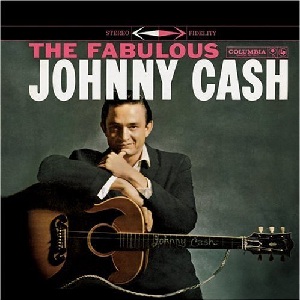
The Fabulous Johnny Cash is the second studio album by American country singer Johnny Cash and his first to be released by Columbia Records. The album was released on November 3, 1958, not long after Cash's departure from Sun Records.

Hymns by Johnny Cash is the third studio album and first gospel album by American singer Johnny Cash. The album was produced in 1958 and was then officially released in 1959. An alternate version of the song It was Jesus was an added bonus track after the album was re-issued in 2002. Cash said he left Sun Records because Sam Phillips would not let him record a gospel album. Columbia promised him to release an occasional gospel album; this was a success for him to record. The album was Cash’s first and most popular gospel album, and is an example of traditional hymns set to country gospel music. The album was recorded simultaneously with The Fabulous Johnny Cash.
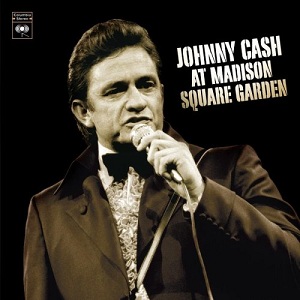
Johnny Cash at Madison Square Garden is a 1969 recording of a Johnny Cash concert at Madison Square Garden. It was released in 2002.

I Walk the Line is the nineteenth studio album by singer and songwriter Johnny Cash, featuring a handful of recent songs alongside new recordings of previous hits throughout his career up to that point. It was released on Columbia Records in 1964. The album was certified Gold by the RIAA in 1967.

Johnny Cash Sings the Ballads of the True West is a concept double album and the 22nd overall album released by country singer Johnny Cash, released on Columbia Records in 1965. Covering twenty individual songs, the album, as its title suggests, contains various ballads and other songs on topics related to the history of the American Old West. This includes Carl Perkins' "The Ballad of Boot Hill", "Streets of Laredo", and the sole single from the album, "Mr. Garfield", describing the shock of the population after the assassination of President James Garfield. One of the songs, "25 Minutes to Go", would later be performed at Folsom Prison and appear on Cash's famous At Folsom Prison recording in 1968, while the melody of "Streets of Laredo" would be recycled for the song "The Walls of a Prison" featured on Cash's album From Sea to Shining Sea.
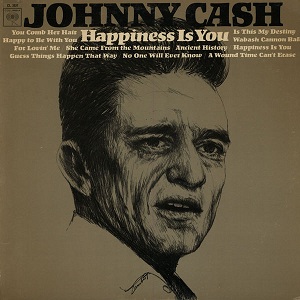
Happiness Is You is the 24th album by country singer Johnny Cash, released on Columbia Records in 1966. It contains, among others, "Guess Things Happen That Way", a re-recording of one of Cash's earliest Sun songs. The record reached #10 on the Country charts. The LP was originally to be titled "That's What You Get For Lovin' Me", taking its title from the Gordon Lightfoot tune included in the album, and promo copies and some early commercial pressings show this title on the label.

From Sea to Shining Sea is a concept album and 26th album by country singer Johnny Cash, released on Columbia Records in 1968. Each track on the album was written by Cash; none of them were released as singles. The album was included on the Bear Family box set Come Along and Ride This Train.

Hello, I'm Johnny Cash is the 33rd album by American country singer Johnny Cash, released on Columbia Records in 1970. "If I Were a Carpenter", a famous duet with Cash's wife, June Carter Cash, earned the couple a Grammy Award for Best Country Performance by a Duo or Group with Vocal in 1971 ; the song also reached #2 on the Country charts. This album also includes "To Beat the Devil", the first Kris Kristofferson song covered by Cash; the two would later collaborate numerous times, most famously on "Sunday Mornin' Comin' Down". "See Ruby Fall" and "Blistered" were also released as singles, and the album itself reached #1 on the country charts and No. 6 on the pop charts. It was certified Gold on January 29, 1970 the RIAA. The album has been released on CD and it has been made available on official download sites. This album is not to be confused with a 1977 Columbia Special Products compilation LP with the same name.

The Johnny Cash Show is the 35th overall album and third live album by American country singer Johnny Cash, recorded at the Grand Ole Opry House and released on Columbia Records in 1970 as a tie-in with Cash's then-current TV series of the same title. Though one of Cash's lesser-known live records, it spawned the highly successful single "Sunday Mornin' Comin' Down", which helped kickstart the career of singer-songwriter Kris Kristofferson. The song and album reached #1 on the Country charts. It was also his final chart entry in Australia, going no higher than #35. The album was certified Gold on February 16, 1995, by the RIAA.

The Last Gunfighter Ballad is the 55th album by American country singer Johnny Cash, released on Columbia Records in 1977. Notable tracks include the title track, "Far Side Banks of Jordan" and "That Silver Haired Daddy of Mine", the latter of which features Cash's brother Tommy Cash. The title track was the album's only single, reaching #38 on the country charts; it tells the tale of an aging gunslinger who finds himself unable to deal with the modern way of life.

Johnny Cash Sings Precious Memories is the fifth gospel and 50th overall album by country singer Johnny Cash, released in 1975 on Columbia Records. It is one of several spiritual albums that he recorded. Other examples include Hymns by Johnny Cash, Hymns from the Heart, The Holy Land and Believe in Him. The song selection includes several of Cash's personal favorites, as some would later be recorded again for My Mother's Hymn Book. Precious Memories may have been a replacement for an untitled Gospel album that Cash recorded during 1975 but never released; those recordings would be released in 2012 on the album Bootleg Vol. IV: The Soul of Truth. The albums was dedicated to Cash's late brother, Jack D. Cash, who died in May 1944.

Johnny Cash på Österåker is a live album by country singer Johnny Cash released on Columbia Records in 1973, making it his 43rd overall release. The album features Cash's concert at the Österåker Prison in Sweden held on October 3, 1972. Its counterparts in concept are the more notable At Folsom Prison (1968), At San Quentin (1969), and A Concert Behind Prison Walls (1976). Unlike aforementioned, På Österåker does not contain any of Cash's most well-known songs; it does, however, include a version of Kris Kristofferson's "Me and Bobby McGee". "Orleans Parish Prison" was released as a single, faring rather poorly on the charts. Cash had previously recorded "I Saw a Man" for his 1959 album, Hymns by Johnny Cash.

The Junkie and the Juicehead Minus Me is the 48th album by country singer Johnny Cash, released in 1974 on Columbia Records. Although credited to Cash alone, the album includes solo performances by his daughter Rosanne Cash, and stepdaughters Rosie Nix Adams and Carlene Carter, predating the launch of their own solo careers. Two songs on the album were written by Kris Kristofferson, while "Don't Take Your Guns to Town" is a re-recording of a highly successful Cash single, his first smash hit for Columbia from back in 1958. "Father and Daughter " is a cover version of a well-known Cat Stevens song and a duet with Cash's stepdaughter, Rosie Nix Adams, with slight changes in lyrics; a version of the same song would be released in 2003 on Unearthed, as a duet with Fiona Apple. June Carter Cash also performs a solo track without her husband, one of only a couple of occasions where she did this on a Johnny Cash album outside of concert recordings.

The Gospel Road: A Story of Jesus is a double album and the fourth gospel album and 45th overall album by American country singer Johnny Cash, released on Columbia Records in 1973. It is the soundtrack to the film of the same name released by Twentieth Century Fox.
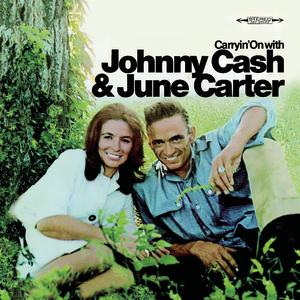
Carryin' On with Johnny Cash & June Carter is an album by Johnny Cash and June Carter released in 1967, on Columbia Records. The album consists exclusively of duets by Cash and Carter, including "Jackson"; "Long-Legged Guitar Pickin' Man" was also released as a single. One track, a cover of Bob Dylan's "It Ain't Me, Babe", dated back to 1964 and had previously been released on Cash's 1965 album, Orange Blossom Special.

"Daddy Sang Bass" is a song written by Carl Perkins, with lines from the chorus of "Will the Circle Be Unbroken?", and recorded by American country music singer Johnny Cash. It was released in November 1968 as the first single from the album The Holy Land. The song was Cash's sixty-first release on the country chart, going on to No. 1 on the Billboard country chart for 6 weeks and spending a total of 19 weeks there. The single reached No. 56 on the Cashbox pop singles chart in 1969. "Daddy Sang Bass" was also released on the Columbia Records Hall of Fame Series as a 45, #13-33153, b/w "Folsom Prison Blues". The record was nominated in the CMA awards category of Single of the Year by the Country Music Association (CMA) in 1969.
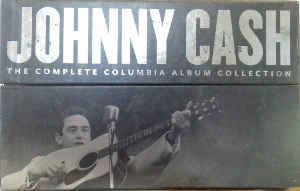
The Complete Columbia Album Collection is a box set by country singer Johnny Cash, released posthumously in 2012 on Columbia Records and Legacy Recordings.




















